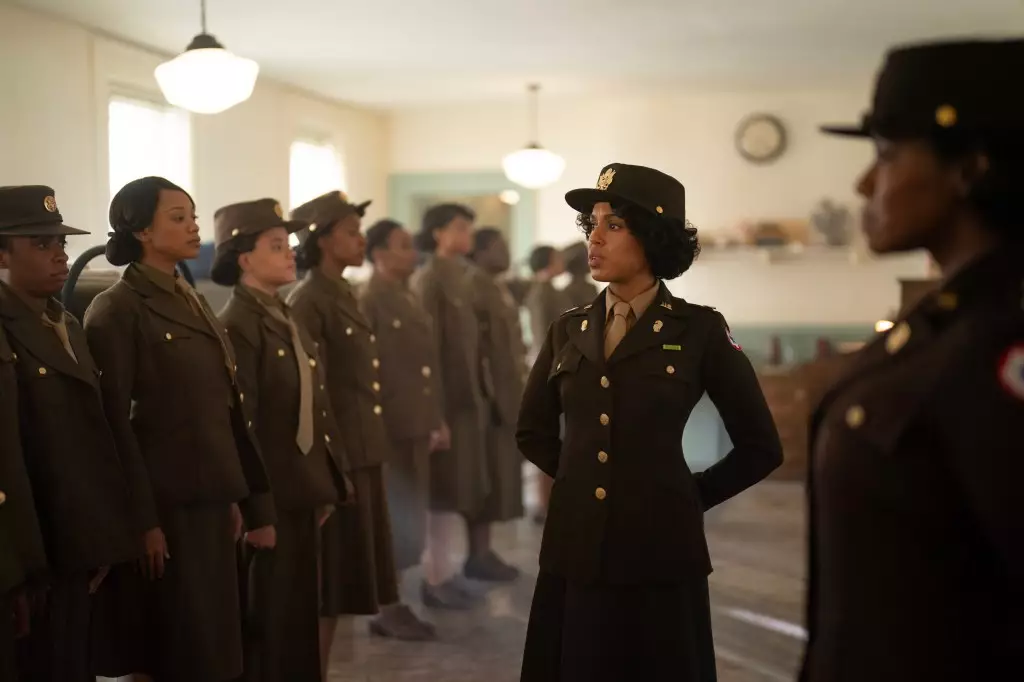Tyler Perry makes a remarkable foray into the WWII genre with his latest directorial venture, *The Six Triple Eight*, now available on Netflix. This film not only sheds light on the touching yet largely undiscovered tale of the Women’s Army Corps Unit of Color but also serves as a poignant reminder of the sacrifices made by Black women during a tumultuous period in history. It focuses on the 6888th Central Postal Directory Battalion, comprised of over 855 women, predominantly African American, who faced adversity of unprecedented magnitude. The film emphasizes their critical role in maintaining morale on the front lines of war, all while combating the twin challenges of racism and sexism.
While the annals of World War II are rife with tales of valor, the story of the *6888th* is one dramatically neglected in mainstream narratives. In a landscape saturated with cinematic portrayals of male soldiers and their epic battles, Perry’s lens offers a different perspective—one that spotlights the unsung heroines whose work was chiefly responsible for ensuring that troops received life-affirming letters from loved ones back home. As we revisit this overlooked chapter of history, we see parallels with other narratives of underrepresented contributions, akin to *Hidden Figures*, which highlighted the achievements of Black women in the space race.
Drawing from Kevin M. Hymel’s WWII Magazine article “Fighting A Two-Front War,” Perry’s film establishes a deeply human connection with its audience. By centering on Major Charity Adams, portrayed impeccably by Kerry Washington, the narrative captures the essence of leadership amidst chaos. The film does not shy away from depicting the brutal realities these women endured—harsh weather, unyielding physical conditions, and the disdain exhibited by male counterparts.
The film’s potency is amplified through its depiction of the various characters that populate this military world. The subplot involving Lena Denniecott King (played by Ebony Obsidian) offers an emotional anchor; her fears and anxieties about her partner’s fate in the war ground the larger military mission in deeply personal stakes. The focus on interconnections provides a telling contrast to the cold, sometimes brutal machinery of war, as audiences are reminded that behind every letter sorted was a life filled with love, worry, and heartache.
Overcoming Obstacles
The journey undertaken by the 6888th was not just logistical but a Herculean emotional endeavor. With over 17 million pieces of mail to anagram, the women embodied the adage, “No Mail, No Morale.” Perry invokes a sense of urgency, fraught with tension, as the audience bears witness to the laborious task of sorting mail under treacherous conditions. The visuals are striking yet authentic, showcasing the women braving stormy seas to fulfill their military assignments, and the exhilarating march sequences choreographed by Debbie Allen provide an awe-inspiring glimpse into their determination.
Yet, amidst their triumphant efforts, the film does not shy away from the realities of oppression. The character of General Halt (Dean Norris) serves as a formidable antagonist, embodying the systemic racism and sexism that pervaded military institutions. He consistently undermines Major Adams, offering a glimpse into the deeply entrenched barriers these women needed to dismantle.
The film’s musical score augments its emotional gravity. Aaron Zigman’s composition effectively underlines the varying tonal shifts—from moments of intense struggle to those of uplifting camaraderie. Diane Warren’s poignant ballad, “The Journey,” sung by H.E.R., provides a captivating backdrop during the film’s end credits, merging contemporary artistry with a historical retrospective.
Production Designer Sharon Busse and Costume Designer Karyn Wagner deserve commendation for their meticulous attention to detail, which immerses viewers in the era. Their craftsmanship reflects a commitment to authenticity that is crucial when telling stories of historical significance.
*The Six Triple Eight* serves as a timely reminder of the sacrifices made by a group of brave women who played an unwritten yet vital role in the success of World War II. Tyler Perry’s narrative approach successfully blends emotional depth with historical accuracy, taking audiences on a journey that is as entertaining as it is enlightening. As this powerful story becomes available to a broad audience on December 20, 2024, it presents an opportunity not only for reflection but also for a deeper appreciation of the contributions of women in uniform. The emotional resonance of this film is set to ignite conversations around race, gender, and the overlooked narratives that deserve a place in history.

Leave a Reply